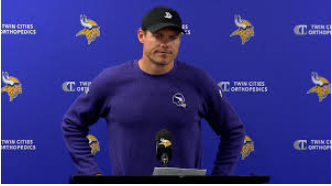Vikings Legend—NFL’s Ironman—Dead at 87, Shaking the Foundation of Minnesota Football
The saddest and most heartbreaking news to shake the Minnesota Vikings community in 2025 came on June 3, when the team and fans around the world mourned the passing of Jim Marshall, a legendary figure whose name is etched into both franchise and NFL history. At 87 years old, Marshall had been privately battling illness, and while his death was not entirely unexpected, it sent shockwaves through the football world, leaving a profound void in the heart of the Vikings organization.
Marshall was not just a player—he was an embodiment of endurance, grit, and unwavering dedication. Revered as the cornerstone of the Vikings’ feared “Purple People Eaters” defensive line, he played 20 consecutive seasons without missing a single game, a record that defined him as the NFL’s original ironman. From the team’s earliest years in the 1960s through the 1970s, he was a constant presence—reliable, relentless, and unbreakable. He played in an astounding 282 consecutive games, an NFL record for a defensive lineman at the time, and helped lead the Vikings to four Super Bowl appearances.
Yet, Marshall’s impact went far beyond tackles, sacks, and stat sheets. He was a quiet leader—a man whose example commanded respect more than his words ever could. Teammates often referred to him as the emotional anchor of the team, someone who carried the weight of expectations without complaint and led with humility. Coaches leaned on his experience. Young players looked up to him. Fans adored him.
Off the field, Jim Marshall was just as legendary. Deeply committed to his adopted home of Minnesota, he gave back through charitable work, youth mentorship, and community outreach programs. He believed football was a platform for greater good, and he used his voice—gently but firmly—to uplift others. His compassion and humility made him a beloved figure not only in sports but in civic life as well.
When news of his death was confirmed, an outpouring of grief and admiration spread throughout the NFL. Tributes flooded in from all corners of the football world. Former teammates described him as a “true brother,” fans held candlelight vigils outside U.S. Bank Stadium, and social media lit up with memories of his toughness and grace. The Vikings organization released a solemn statement calling him “a founding figure in our history and the spirit of Vikings football.”
Perhaps most striking is the legacy of inspiration Marshall leaves behind. In an era of frequent trades and short careers, he stood as a symbol of loyalty, having played nearly his entire professional career in purple and gold. His jersey—number 70—is permanently etched in the memory of fans and deserves to hang in Canton, Ohio, a sentiment echoed by many now calling for his long-overdue induction into the Pro Football Hall of Fame.
Jim Marshall’s passing is more than just the loss of a former player; it’s the loss of a living legend, a bridge between generations of Vikings fans, and a man who helped define what it meant to wear the horns on his helmet with pride.
He may be gone, but his story, his toughness, and his heart will live on in the memories of those who watched him, knew him, and were inspired by him. Minnesota football will never be the same.





